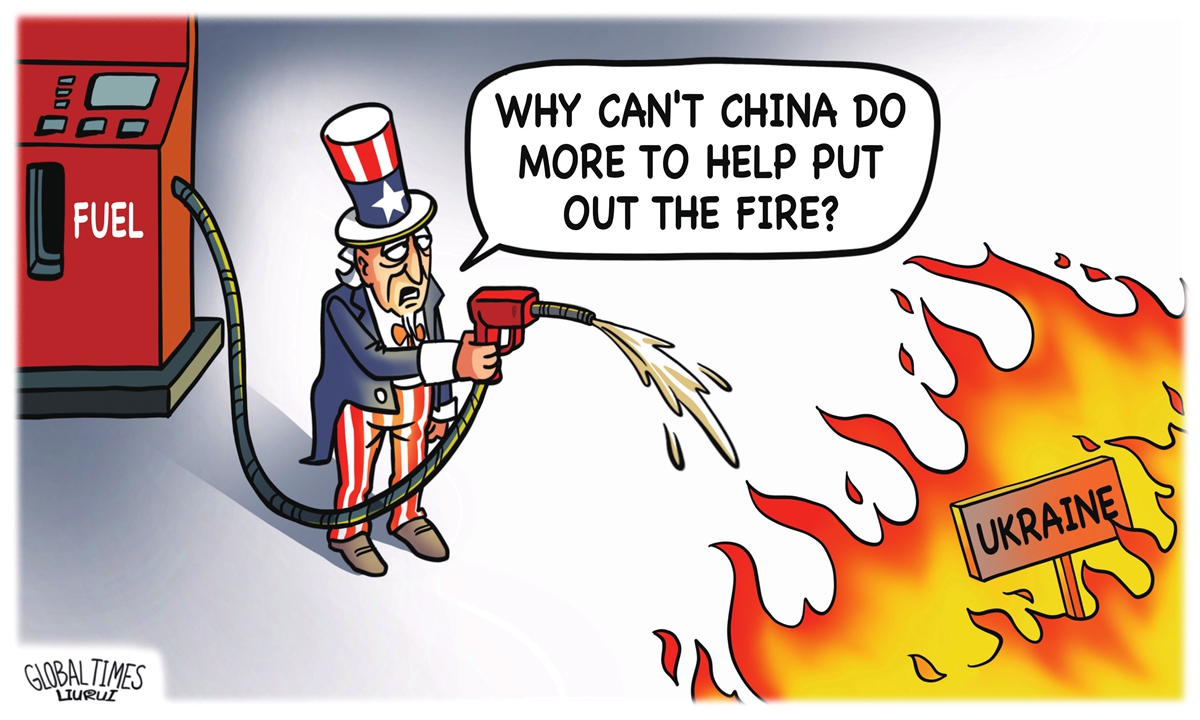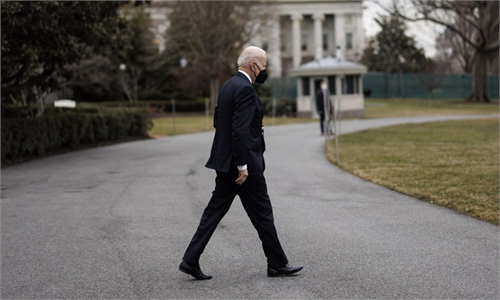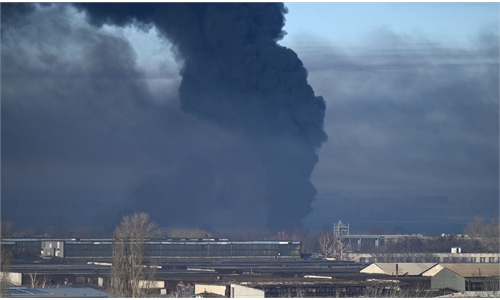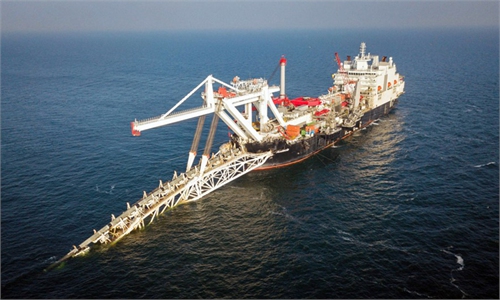US distorts China’s neutral stance, ‘uses Ukraine crisis to sow discord between China, Russia’

Illustration: Liu Rui/GT
Click here to stay tuned with our live updates on Ukraine tensions.
The US has tried very hard to distort China's neutral stance of calling for dialogue on the Ukraine crisis, with the US State Department asking China to "pressure Russia" to respect the principle of national sovereignty and territorial integrity, and even accusing China of "using Russia to create a new world order."
China on Thursday said the US, a country which launched a series of wars and military interventions that trample on other countries' sovereignty, has no qualification to accuse others on the matter.
Chinese Foreign Ministry spokesperson Hua Chunying made the remarks at Thursday's routine press conference as she had received many questions on Russia's latest military operations and the China-Russia ties from the media due to the US continually raising odd questions to target China.
Chinese analysts said the US, by distorting China's neutral stance, is trying to make China look embarrassed, but Washington is the one that should be ashamed as it has done nothing to prevent conflict but only strained the situation, when others were trying to mediate the crisis.
On Wednesday, Ned Price, spokesperson of the US Department of State, claimed that every responsible country should pressure Russia, to "incentivize, to advocate for Vladimir Putin to back down, for the Russian Federation to deescalate [the crisis]," while accusing China of being inconsistent with words and deeds.
"When it comes to respect for state sovereignty and territorial integrity, I'm afraid the US is in no position to tell China off," Hua said, noting that just about 20 years ago, the Chinese embassy in the Federal Republic of Yugoslavia was hit by NATO bombing, which killed three Chinese journalists and injured many more. NATO still owes the Chinese people a debt of blood, she said.
"Even today, China still faces a realistic threat from the US, flanked by its several allies as they wantonly and grossly meddle in China's domestic affairs and undermine China's sovereignty and security on issues related to Xinjiang, Hong Kong and Taiwan. China remains the only permanent member of the UN Security Council that has yet to realize complete national reunification," Hua noted.
It is because of all these that China consistently and firmly upholds the purposes and principles of the UN Charter and basic norms governing international relations, firmly safeguards its sovereignty, security and territorial integrity, and firmly defends international equity and justice, Hua said,
If we look at the US, during its nearly 250 years of history, there were only 20 years when it was not conducting military operations overseas. The pretexts it used can be democracy or human rights or simply a test tube of laundry powder or even fake news, Hua said, noting such a country's understanding of respect for state sovereignty and territorial integrity is definitely different from China's.
Cui Heng, an assistant research fellow at the Center for Russian Studies of East China Normal University, told the Global Times on Thursday that the US has long been "trying to sow discord between China and Russia. This time the US just wants to use the crisis to embarrass China by making trouble between China and Russia. However, the principle was first damaged by the US."
The principle of respecting sovereignty and territorial integrity was established after World War II with the cost of tens of millions lives, Cui said. "But it seems the US has already forgotten it was the US that broke the principle first in the Kosovo War, the Iraq War and other wars. These made the principle exist in name only. The principle had already been damaged many times by the US."
The US is still trying to distort China's position of neutrality, and "Washington, as the creator of a bad precedent in breaking the principle, wants to blame China for the mistake the US itself has made," Cui said.
New international order?
Price also said that "you will have to ask the PRC (People's Republic of China) whether they have used their own considerable influence with the Russian Federation to that end. Of course, we've all read the 5,000-word joint communiqué, and we can glean our own conclusions from that."
"I don't believe Russia would be too pleased to hear that," Hua said. Russia is a permanent member of the UN Security Council and an independent major power. It is fully capable of formulating and implementing its diplomatic strategy independently based on its judgment and national interests, she said.
She also noted China has no interest in the friend-or-enemy dichotomous Cold War thinking and the patchwork of so-called allies and small cliques, and has no intention to follow such a path.
On the China-Russia joint statement signed earlier this year, "I suggest the US read it carefully," Hua said, as China and Russia strengthening strategic communication and coordination is firmly safeguarding the United Nations-driven international architecture and the international laws-based world order, which is exactly what a responsible act should look like.
Wang Yiwei, director of the institute of international affairs at the Renmin University of China, told the Global Times on Thursday, "The US does not only want to impose sanctions on Russia but also wants to drag China [into the crisis]. At the NATO summit to be held in Madrid in June, when NATO needs to formulate a strategic action plan in 2030, the US also wants to turn China into NATO's main enemy after Russia."
"The fact is that these European countries are not willing to make more enemies. They cannot even deal with Russia, how can they deal with China and Russia at the same time? But the US just wants Europe to obey and serve its big-power competition strategy, and this just proves that the US does not respect the opinions of its allies," Wang said.
For the China-Russia-US triangular relations, the sanctions that the West imposed on Russia are like "a test," said observers, because these sanctions could also happen to China in the future if the Chinese mainland is forced to solve the Taiwan question by non-peaceful means.
A Beijing-based expert who asked for anonymity said comparing the Ukraine crisis to the Taiwan question is not correct because Taiwan is not a country and the one-Chine principle is universally recognized by the international community. Even the US dares not abandon it openly. So even if China is forced to reunify Taiwan by force, China should not receive the same criticism that Russia has received now.
Lü Xiang, a research fellow at the Chinese Academy of Social Sciences, said China is way more connected with the world than Russia as China is the biggest and most energetic market and key supplier in many fields, and China-US trade ties are way more intertwined than US-Russia trade. So imposing sanctions on China in the future is unimaginable and extremely difficult for the US.
How the world order would change is a question, but one thing is for sure: That with the big headache in Europe, the US does not have any more resources to build its anti-China Indo-Pacific Strategy, said Chinese analysts.




